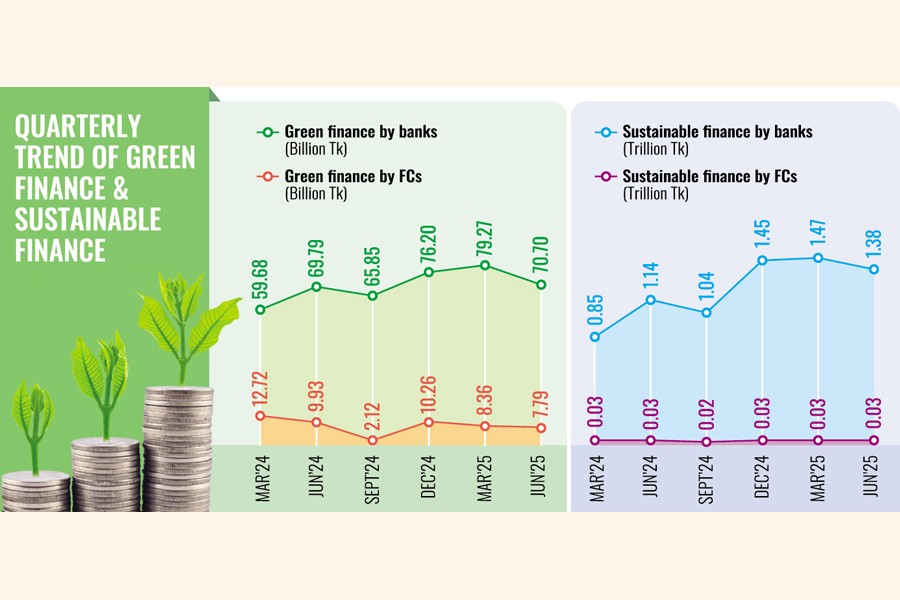
Published :
Updated :

Bangladesh's banks and finance companies (FCs) witnessed a notable slowdown in both green-and sustainable-finance disbursements during the April-June 2025 period, reflecting weaker momentum in environment-friendly and socially responsible lending compared to the previous quarter.
According to the latest data from the Bangladesh Bank (BB), the total distribution in green finance by banks and FCs stood at Tk 78.49 billion in this period, down from Tk 87.63 billion in the January-March quarter, marking a decrease of 10.43 per cent.
Similarly, the total disbursement in sustainable finance by banks and FCs reached Tk 1.41 trillion in the said period, down from Tk 1.50 trillion in the preceding quarter, witnessing a decline of 6.0 per cent.
A total of 43 banks out of 61 and 10 FCs out of 34 had exposure in green finance in the reporting quarter.
The total amount invested as green finance was Tk 70.70 billion by banks and Tk 7.78 billion by FCs in this period.
The introduction of the Sustainable Finance Policy has provided banks and finance companies with opportunities to contribute to inclusive, sustainable green growth.
This includes green finance; sustainable agriculture; sustainable cottage, micro, small, and medium enterprises (CMSMEs); socially responsible financing; and other activities linked to sustainability.
In 2025, the targets of green finance and sustainable finance for banks and FCs are Tk 678.21 billion and over Tk 5.43 trillion, respectively.
These targets have been calculated based on their net loans and advances outstanding till December 31, 2024.
From 2025 onwards, banks and FCs should set their green finance target at 5.0 per cent, and sustainable finance target at 40 per cent, of their net loans and advances outstanding.
Analysts believe achieving these goals will require a stronger policy push, improved access to concessional funds, and greater private sector participation.
Dr Masrur Reaz, chairman of Policy Exchange Bangladesh, says the slowdown in green and sustainable finance disbursement indicates the need for stronger alignment between financial incentives, environmental goals, and relevant regulations.
"Banks are still approaching sustainability largely as a compliance requirement rather than a business opportunity," he observes.
He says targeted fiscal and regulatory incentives, improved risk assessment tools, and enhanced project pipelines in the renewable energy and circular economy sectors can help accelerate green financing.
"Unless banks begin to view sustainability as part of their core business model, progress will remain uneven despite strong regulatory guidance," Dr Reaz adds.
sajibur@gmail.com


 For all latest news, follow The Financial Express Google News channel.
For all latest news, follow The Financial Express Google News channel.